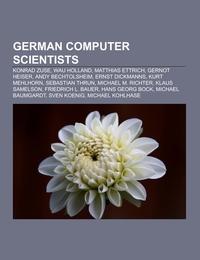Detailansicht
German computer scientists
Konrad Zuse, Wau Holland, Matthias Ettrich, Gernot Heiser, Andy Bechtolsheim, Ernst Dickmanns, Kurt Mehlhorn, Sebastian Thrun, Michael M.Richter, Klaus Samelson, Friedrich L.Bauer, Hans Georg Bock, Michael Baumgardt, Sven Koenig
ISBN/EAN: 9781155668673
Umbreit-Nr.: 4036188
Sprache:
Englisch
Umfang: 38 S.
Format in cm: 0.3 x 24.6 x 18.9
Einband:
kartoniertes Buch
Erschienen am 27.09.2012
Auflage: 1/2012
- Zusatztext
- Source: Wikipedia. Pages: 38. Chapters: Konrad Zuse, Wau Holland, Matthias Ettrich, Gernot Heiser, Andy Bechtolsheim, Ernst Dickmanns, Kurt Mehlhorn, Sebastian Thrun, Michael M. Richter, Klaus Samelson, Friedrich L. Bauer, Hans Georg Bock, Michael Baumgardt, Sven Koenig, Michael Kohlhase, Christoph Meinel, Marcus Hutter, Reinhard Wilhelm, Michael Kölling, Peter Baumann, Bernhard Preim, Wolfram Burgard, Hartmut Neven, Karl Steinbuch, Hans-Paul Schwefel, Carl Adam Petri, Bernhard Nebel, Hans-Peter Kriegel, Kai Krause, Rudi Studer, Bernd Fix, Markus Kuhn, Egon Börger, Wilfried Brauer, Christof Ebert, Frieder Nake, Osmar R. Zaiane, Jochen Liedtke, Michael E. Auer, Manfred Broy, Raimund Seidel, Michael Stal, Susanne Albers, Hans Meuer, Bernhard Korte, Klaus Knopper, Wolfgang Nebel, Gerhard Weikum, Holger H. Hoos, Chris Tomic, Hartmut Surmann, Jörg-Rüdiger Sack, Pascal Costanza, Ingo Rechenberg, Friedemann Mattern, Martin Odersky, Klaus Dittrich, Wolfgang Wahlster, Franz Baader, Horst Zuse, Udo Frese, Harald Ganzinger, Hans Witsenhausen, Dieter Fox, Torsten Suel, Arnold Schönhage, Juergen Pirner, Daniel A. Keim, Rudolf Bayer, Alexander Strehl, Ingo Wegener, Christof Leng, Michael Ley, Günter Hotz, Dietmar Saupe, Bernhard Schölkopf, Hans Hagen, Walter F. Tichy. Excerpt: Konrad Zuse (German pronunciation:; (1910-1995) was a German civil engineer and computer pioneer. His greatest achievement was the world's first functional program-controlled Turing-complete computer, the Z3, which became operational in May 1941. Zuse was also noted for the S2 computing machine, considered the first process-controlled computer. He founded one of the earliest computer businesses in 1941, producing the Z4, which became the world's first commercial computer. In 1946, he designed the first high-level programming language, Plankalkül. In 1969, Zuse suggested the concept of a computation-based universe in his book Rechnender Raum (Calculating Space). Much of his early work was financed by his family and commerce, but after 1939 he was given resources by the Nazi German Government. Due to World War II, Zuse's work went largely unnoticed in the UK and the US. Possibly his first documented influence on a US company was IBM's option on his patents in 1946. There is a replica of the Z3, as well as the original Z4, in the Deutsches Museum in Munich. The Deutsches Technikmuseum in Berlin has an exhibition devoted to Zuse, displaying twelve of his machines, including a replica of the Z1 and several of Zuse's paintings. Zuse Z1 replica in the German Museum of Technology in BerlinBorn in Berlin, Germany 22 June 1910, he moved with his family in 1912 to Braunsberg, East Prussia, where his father was a postal clerk. Zuse attended the Collegium Hosianum in Braunsberg. In 1923, the family moved to Hoyerswerda, where he passed his Abitur in 1928, qualifying him to enter university. He enrolled in the Technische Hochschule Berlin-Charlottenburg and explored both engineering and architecture, but found them boring. Zuse then pursued civil engineering, graduating in 1935. For a time he worked for the Ford Motor Company, using his considerable artistic skills in the design of advertisements. He started work as a design engineer at the Henschel aircraft factory in Berlin-Sc
